Fleurs du Mal Magazine


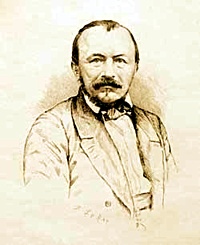
A Madame Sand
« Ce roc voûté par art, chef-d’oeuvre d’un autre âge,
Ce roc de Tarascon hébergeait autrefois
Les géants descendus des montagnes de Foix,
Dont tant d’os excessifs rendent sûr témoignage. »
O seigneur Du Bartas ! Je suis de ton lignage,
Moi qui soude mon vers à ton vers d’autrefois ;
Mais les vrais descendants des vieux Comtes de Foix
Ont besoin de témoins pour parler dans notre âge.
J’ai passé près Salzbourg sous des rochers tremblant ;
La Cigogne d’Autriche y nourrit les Milans,
Barberousse et Richard ont sacré ce refuge.
La neige règne au front de leurs pies infranchis ;
Et ce sont, m’a-t-on dit, les ossements blanchis
Des anciens monts rongés par la mer du Déluge.
Gérard de Nerval
(1808 – 1855)
A Madame Sand
fleursdumal.nl magazine
More in: Archive M-N, Archive S-T, George Sand, Nerval, Gérard de
Et puis, pas de rentrée littéraire sans Amélie Nothomb ! Vous le savez : Amélie Nothomb est la marraine de cette émission.
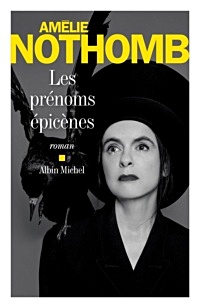 Elle sera donc à mes côtés pour ce premier rendez-vous de la saison et évoquera son 27ème roman, « Les prénoms épicènes » (Albin Michel), l’histoire d’une relation père-fille dans laquelle la frontière entre l’amour et la haine se montre particulièrement ténue.
Elle sera donc à mes côtés pour ce premier rendez-vous de la saison et évoquera son 27ème roman, « Les prénoms épicènes » (Albin Michel), l’histoire d’une relation père-fille dans laquelle la frontière entre l’amour et la haine se montre particulièrement ténue.
La Grande Librairie
Depuis 1992 et Hygiène de l’assassin, tous les livres d’Amélie Nothomb ont été publiés aux éditions Albin Michel. Elle a reçu, entre autres, le prix Chardonne, le Grand prix du roman de l’Académie française, le prix de Flore, et le Grand prix Jean Giono pour l’ensemble de son oeuvre. Ses oeuvres sont traduites dans 40 langues, des U.S.A. au Japon.
Amélie Nothomb est un écrivain belge de langue française. Elle est né le 13 août 1967 à Kobe, au Japon, où son père, le baron Patrick Nothomb, fut ambassadeur de Belgique. Belgique, qu’elle ne connaîtra qu’à 17 ans, pour y terminer ses études de philologie romane à l’Université libre de Bruxelles.
Depuis 1992, Amélie Nothomb publie aux éditions Albin Michel un roman par an.
Amélie Nothomb
Les Prénoms épicènes
Édition brochée
€17.50
22 Août 2018
130mm x 200mm
Broché: 162 pages
Editeur : Albin Michel
Collection : A.M. ROM.FRANC
Langue : Français
ISBN-10: 2226437347
ISBN-13: 978-2226437341
Dimensions du produit: 13 x 1,5 x 20,4 cm
Littérature française
Éditeur Albin Michel
Nombre de pages 162
Langue français
new books
fleursdumal.nl magazine
More in: - Book News, - Bookstores, Archive M-N, Archive M-N, Art & Literature News, Maison de la Poésie
September at WIELS will be marked by the pictorial work and the poetic imagination of René Daniëls.
Come to discover over 75 paintings – several of which have never been exhibited and have been specially restored for the occasion – in addition to hundred drawings by the artist who has made his mark on the history of painting.
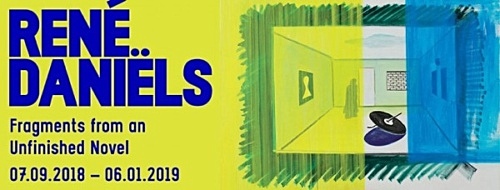
René Daniëls occupies a prominent place in the history of contemporary art from the latter half of the 20th century, despite the fact that his career was abruptly interrupted in 1987 after he suffered a stroke.
Emerging in the late 1970s, when figurative and expressive painting once again became popular, Daniëls soon developed an original, personal language. Although he enjoyed early recognition, Daniëls had no qualms about experimenting with different pictorial styles.
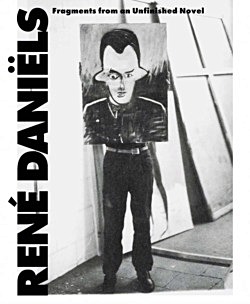 Nevertheless, certain motifs recur under constantly changing forms, following an associative, dream-like logic. Not unlike a composer, Daniëls devises variations on a theme. From 1984 onwards, one motif was to play a dominant role: that of an exhibition room seen in perspective. This form, resembling a bow tie, is reproduced in compositions in which he plays with mirroring effects, overlapping layers, or changes of direction.
Nevertheless, certain motifs recur under constantly changing forms, following an associative, dream-like logic. Not unlike a composer, Daniëls devises variations on a theme. From 1984 onwards, one motif was to play a dominant role: that of an exhibition room seen in perspective. This form, resembling a bow tie, is reproduced in compositions in which he plays with mirroring effects, overlapping layers, or changes of direction.
Inspired by the title of one of the rare texts written by Daniëls, the exhibition Fragments from an Unfinished Novel explores the phenomenon of déjà vu and the relation between perception and memory, which lie at the heart of his practice.
Including historic paintings and several works never previously exhibited, the exhibition recounts the development of Daniëls’ visual language by exploring the effects of repetition and variation inherent in his work. A wide selection of drawings completes the presentation, offering a closer understanding of the evolution of his vocabulary.
René Daniëls:
Fragments from an Unfinished Novel
07.09.2018 – 06.01.2019
WIELS
Kunst · Brussel (stad)
Contemporary Art Centre
Avenue Van Volxemlaan 354
1190 Brussels
# more on exhibition rené daniëls
rené daniëls exhibition
fleursdumal.nl magazine
More in: - Book Stories, Art & Literature News, Exhibition Archive, FDM Art Gallery, René Daniëls
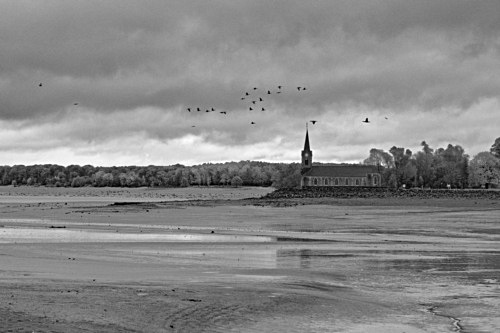
Hans Hermans© photos: landscape
(101 – lac du der F)
# more on website hans hermans photos
fleursdumal.nl magazine
More in: FDM Art Gallery, Hans Hermans Photos, Photography
Een jonge Turks-Duitse duwt een Duitser voor de metro. Hij sterft, zij voelt geen berouw. Warm en vurig vertelt Fatma Aydemir over diegenen die tussen culturen en landen leven en hun plaats op de wereld zoeken.
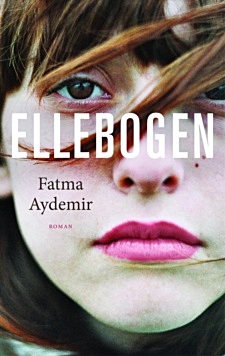 Ze is zeventien. Ze is in Berlijn geboren. Ze heet Hazal Akgündüz. Er werd haar beloofd dat ze alles kon worden wat ze maar wou. Maar steeds opnieuw moet ze opboksen tegen vooroordelen en discriminatie.
Ze is zeventien. Ze is in Berlijn geboren. Ze heet Hazal Akgündüz. Er werd haar beloofd dat ze alles kon worden wat ze maar wou. Maar steeds opnieuw moet ze opboksen tegen vooroordelen en discriminatie.
Tot ze op een nacht te veel gedronken heeft en een Duitse student die haar uitdaagt, voor de metro duwt. Als de politie haar achterna zit vlucht Hazal naar Istanbul, waar ze nooit eerder is geweest. Ze ziet op krantenfoto’s de grijns op haar gezicht terwijl ze de jongen aanvalt maar voelt geen berouw.
Ellebogen is een urgent, gewaagd en onverzoenlijk verhaal over de woede van een migrantendochter in een Europa waar ze zich nooit helemaal thuis voelde.
Fatma Aydemir (1986) is de dochter van Turkse gastarbeiders. Ze heeft Duits en Amerikanistiek gestudeerd en werkt als redacteur voor de krant Taz. Haar controversiële debuutroman Ellebogen werd meteen een fenomeen in Duitsland. Op 11 maart 2017 kopte de Volkskrant al: ‘Over dit debuut schrijven alle Duitse kwaliteitskranten’. Aydemir neemt met regelmaat deel aan het publieke debat over integratie in Duitsland.
“‘Ellebogen is een stomp in de maag. Of beter gezegd, twee. Eén voor de misogyne Turkse gemeenschap. En één voor de huichelarij van onze o zo liberale samenleving.’” – Süddeutsche Zeitung
Titel: Ellebogen
Auteur: Fatma Aydemir
Vertaler(s): Marcel Misset
240 pagina’s
€ 19,99
Uitgever: Signatuur
2017
ISBN: 978-90-5672-590-7
NUR: 302
new books
fleursdumal.nl magazine
More in: - Book News, - Bookstores, Archive A-B, Art & Literature News, Galerie Deutschland







Hans Ebeling Koning
Appelboom (Apple tree)
Hans Ebeling Koning (1931) received his education at AKI in Enschede where he later became a teacher in drawing and painting. His work is represented in many public and private collections including Museum Henriette Polak in Zutphen, Rijksmuseum Twente and the Museum of Modern Art in Arnhem.
Hans Ebeling Koning © 2018
fleursdumal.nl magazine
More in: Art & Literature News, Exhibition Archive, FDM Art Gallery, Hans Ebeling Koning
Op zaterdag 6 oktober organiseert Museum Dr8888 (Drachten) het Dada Poëziebal in Schouwburg De Lawei.
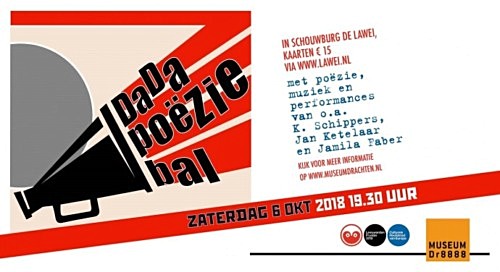
Vanaf 19.30 uur presenteert het museum in de Kleine Zaal een verrassend en onvoorspelbaar programma met poëzie, performances, muziek, beeld en dans.
Optredens worden verzorgd door o.a. K. Schippers, Astrid Lampe, Nyk de Vries, Jan Ketelaar, Meindert Talma en Andries de Jong. Het Poëziebal is onderdeel van het buitenprogramma van Museum Dr8888 en vindt plaats in het kader van Leeuwarden-Friesland 2018.
De avond wordt een beleving op zich en laat zich het best omschrijven als extravagant, intiem, verrassend en een tikkeltje rebels. Het Dada Poëziebal begint om 19.30 uur en vindt plaats in de Kleine Zaal van De Lawei. Het wordt een avondvullend programma met een divers palet aan multidisciplinaire performances waarin tegelijkertijd en op meerdere plekken tegelijk wordt geprogrammeerd. Optredens worden verzorgd door K. Schippers, Astrid Lampe, Jan Ketelaar, Alison Isadora, Jaap Blonk, Tim Schouten, Felicity Provan en Laura Polence, studenten Beeld en Taal van de Gerrit Rietveld Academie, Meindert Talma, Tijdelijke Toon, Bram Zielman, Andries de Jong, Leendert Vooijce, Nyk de Vries, Redactielokaal met Jamila Faber en Arjan Hut, Natasja Hoekstra en dansers en Willie Darktrousers.
Presentator van de avond: Karel Hermans. Regie van de avond is in handen van Janneke de Haan i.s.m. Sanne van Balen.
# Kaarten zijn verkrijgbaar via: www.lawei.nl
Dada Poëziebal met o.a. Jan Ketelaar, K. Schippers en Astrid Lampe in Schouwburg De Lawei in Drachten op zaterdag 6 oktober 2018
more dada
fleursdumal.nl magazine
More in: Antony Kok, Art & Literature News, DADA, Dada, Dadaïsme, De Stijl, Doesburg, Theo van, Evert en Thijs Rinsema, K. Schippers, Kok, Antony, Kurt Schwitters, Kurt Schwitters, Performing arts, Schippers, K., Schwitters, Kurt, THEATRE, Theo van Doesburg, Tzara, Tristan, Visual & Concrete Poetry, Werkman, Hendrik Nicolaas
“One of the strongest and most vital accounts of a life ever set down on paper. . . . Genet has dramatized the story of his own life with a power and vision which take the breath away. The Thief’s Journal will undoubtedly establish Genet as one of the most daring literary figures of all time.” — The New York Post
 The Thief’s Journal is perhaps Jean Genet’s most authentically biographical novel, personifying his quest for spiritual glory through the pursuit of evil. Writing in the intensely lyrical prose style that is his trademark, the man Jean Cocteau dubbed France’s “Black Prince of Letters” here reconstructs his early adult years—time he spent as a petty criminal and vagabond, traveling through Spain and Antwerp, occasionally border hopping across the rest of Europe, always one step ahead of the authorities.
The Thief’s Journal is perhaps Jean Genet’s most authentically biographical novel, personifying his quest for spiritual glory through the pursuit of evil. Writing in the intensely lyrical prose style that is his trademark, the man Jean Cocteau dubbed France’s “Black Prince of Letters” here reconstructs his early adult years—time he spent as a petty criminal and vagabond, traveling through Spain and Antwerp, occasionally border hopping across the rest of Europe, always one step ahead of the authorities.
The infamous playwright, poet, novelist, and criminal, Jean Genet, was born December 19th, 1910, in France. Genet’s mother, who was a young prostitute at the time of his birth, gave him up for adoption to a provincial family. By the age of fifteen, for repeated misdemeanors, Genet was incarcerated for three years, after which he joined the French Foreign Legion. He was dishonorably discharged for “lewd acts”, henceforth spending the next several years traveling around Europe, at times as a prostitute. In 1937 he came to Paris, where again he was arrested and imprisoned for vagabondage. It was in prison, though, that Genet personally funded his first novel Our Lady of the Flowers (1944).
After being released from prison, Genet sought out the avant-garde writer, Jean Cocteau, who was impressed by Genet’s work, and even petitioned the French president, along with Jean-Paul Sartre, to exonerate Genet, after being faced with a life sentence. Genet became associated with the Theatre of Cruelty, which his most famous pieces became associated with, for example, The Maids (1949), Deathwatch (1949), The Balcony (1956), and The Blacks (1958). Other celebrated works of Genet include the novel, A Thief’s Journal (1949), about his experiences in prison, and The Screens (1963), a biting political play about the Algerian War of Independence. Genet died of throat cancer in 1986.
Published in 1964, and again on August 21, 2018: Jean Genet’s The Thief’s Journal, with a new intro by Patti Smith
The Thief’s Journal
by Jean Genet
With a New Introduction by Patti Smith
Translated from French by Bernard Frechtman
Foreword by Jean-Paul Sartre
Imprint Grove Paperback
Grove Press
272 pages
Publication Date August 21, 2018
ISBN-13 978-0-8021-2827-0
Dimensions 5.5″ x 8.25″
US List Price $16.00
new books
fleursdumal.nl magazine
More in: - Book News, Archive G-H, Art & Literature News, Jean Genet, Jean-Paul Sartre, Smith, Patti
Het grootste poëziefeest van het jaar kent in 2018, op 29 september, zijn 36ste editie, in de vertrouwde Grote Zaal van TivoliVredenburg in Utrecht. De beste Nederlandstalige dichters, van debutant tot veteraan, bieden het publiek een poëtische marathon die zijn weerga niet kent.
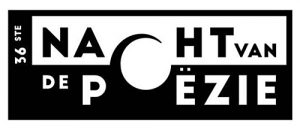
En dan zijn er nog muzikale entr’actes, die de dichters gedurende de avond in razend tempo afwisselen.
De Nacht van de Poëzie betovert haar bezoekers tot diep in de nacht en laat ze met een glimlach huiswaarts keren.
Onder de dichters bevinden zich dit jaar onder meer ‘nachtveteraan’ Judith Herzberg, P.C. Hooftprijswinnaar Willem Jan Otten en Radna Fabias, die dit jaar de C. Buddingh’-prijs voor het beste debuut in ontvangst mocht nemen. Na ruim duizend optredens, maakt Arthur Japin zijn debuut op De Nacht naar aanleiding van zijn bundel Nachtkaravaan, met liedjes en gedichten. Verder zijn er dichters die schrijven over dwaallichten en vloekschriften, buigt de een zich over het paringsritueel en de ander over de begrafenis van de mannen. Iemand zegt: ‘Ik was een hond’, een ander begint een oefening in het alleen lopen; er zijn lofzangen op een kapstok en een röntgenfotomodel. ‘Zo kan het niet langer,’ foetert de een, ‘het leven deugt, althans, op onderdelen’, besluit de ander. De bundeltitels van de optredende dichters tijdens deze nacht beloven alvast een bonte parade van taalgiganten, fluisterdichters, tongbrekers en woordacrobaten.
De presentatie van de avond is als vanouds in handen van het Nachtduo Piet Piryns & Ester Naomi Perquin. In de aanloop naar De Nacht worden steeds meer dichters en muzikanten bekend gemaakt.
Tip: met een Nacht-de-Luxe-kaart ontloop je de Nachtelijke Volksverhuizing, zoals Ingmar Heytze het ooit noemde, waarbij je nooit zeker weet of je stoel nog vrij is.
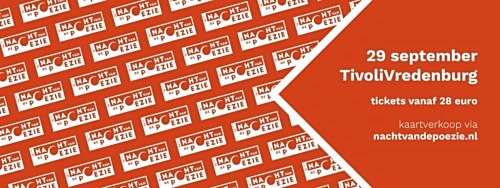
Dit seizoen is er ook weer een KinderNacht van de Poëzie! Kinderen kunnen samen met hun ouders, familie en vriendjes luisteren naar grappige gedichten en raadselachtige rijmpjes.
Radna Fabias – Ester Naomi Perquin – Arthur Japin – Arno Van Vlierberghe – The Tallest Man On Earth – Kreek Daey Ouwens – Rodaan Al-Galidi – Moya De Feyter – Ted van Lieshout – Piet Piryns – Tsead Bruinja – Thomas Möhlmann – Anton Korteweg – Anneke Claus – Benno Barnard – Paul Bogaert – Delphine Lecompte – Willem Thies – Vicky Francken – Judith Herzberg
36ste Nacht van de Poëzie
Het grootste poëziefeest van het jaar
zaterdag 29 september 2018
Tijd: 20:00 uur
Poëzie
Nederlands
TivoliVredenburg
Vredenburgkade 11
3511 WC Utrecht
# Meer informatie op website nachtvandepoezie
36ste Nacht van de Poëzie
fleursdumal.nl magazine
More in: # Music Archive, #Archive Concrete & Visual Poetry, #Editors Choice Archiv, Art & Literature News, Heytze, Ingmar, Lecompte, Delphine, Nacht van de Poëzie, STREET POETRY, THEATRE
The Music on the Hill
Sylvia Seltoun ate her breakfast in the morning-room at Yessney with a pleasant sense of ultimate victory, such as a fervent Ironside might have permitted himself on the morrow of Worcester fight. She was scarcely pugnacious by temperament, but belonged to that more successful class of fighters who are pugnacious by circumstance.
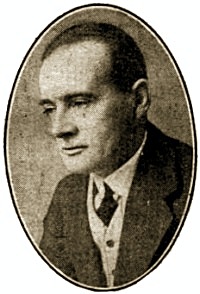 Fate had willed that her life should be occupied with a series of small struggles, usually with the odds slightly against her, and usually she had just managed to come through winning. And now she felt that she had brought her hardest and certainly her most important struggle to a successful issue. To have married Mortimer Seltoun, “Dead Mortimer” as his more intimate enemies called him, in the teeth of the cold hostility of his family, and in spite of his unaffected indifference to women, was indeed an achievement that had needed some determination and adroitness to carry through; yesterday she had brought her victory to its concluding stage by wrenching her husband away from Town and its group of satellite watering-places and “settling him down,” in the vocabulary of her kind, in this remote wood-girt manor farm which was his country house.
Fate had willed that her life should be occupied with a series of small struggles, usually with the odds slightly against her, and usually she had just managed to come through winning. And now she felt that she had brought her hardest and certainly her most important struggle to a successful issue. To have married Mortimer Seltoun, “Dead Mortimer” as his more intimate enemies called him, in the teeth of the cold hostility of his family, and in spite of his unaffected indifference to women, was indeed an achievement that had needed some determination and adroitness to carry through; yesterday she had brought her victory to its concluding stage by wrenching her husband away from Town and its group of satellite watering-places and “settling him down,” in the vocabulary of her kind, in this remote wood-girt manor farm which was his country house.
“You will never get Mortimer to go,” his mother had said carpingly, “but if he once goes he’ll stay; Yessney throws almost as much a spell over him as Town does. One can understand what holds him to Town, but Yessney —” and the dowager had shrugged her shoulders.
There was a sombre almost savage wildness about Yessney that was certainly not likely to appeal to town-bred tastes, and Sylvia, notwithstanding her name, was accustomed to nothing much more sylvan than “leafy Kensington.” She looked on the country as something excellent and wholesome in its way, which was apt to become troublesome if you encouraged it overmuch. Distrust of town-life had been a new thing with her, born of her marriage with Mortimer, and she had watched with satisfaction the gradual fading of what she called “the Jermyn-street-look” in his eyes as the woods and heather of Yessney had closed in on them yesternight. Her will-power and strategy had prevailed; Mortimer would stay.
Outside the morning-room windows was a triangular slope of turf, which the indulgent might call a lawn, and beyond its low hedge of neglected fuchsia bushes a steeper slope of heather and bracken dropped down into cavernous combes overgrown with oak and yew. In its wild open savagery there seemed a stealthy linking of the joy of life with the terror of unseen things. Sylvia smiled complacently as she gazed with a School-of-Art appreciation at the landscape, and then of a sudden she almost shuddered.
“It is very wild,” she said to Mortimer, who had joined her; “one could almost think that in such a place the worship of Pan had never quite died out.”
“The worship of Pan never has died out,” said Mortimer. “Other newer gods have drawn aside his votaries from time to time, but he is the Nature–God to whom all must come back at last. He has been called the Father of all the Gods, but most of his children have been stillborn.”
Sylvia was religious in an honest vaguely devotional kind of way, and did not like to hear her beliefs spoken of as mere aftergrowths, but it was at least something new and hopeful to hear Dead Mortimer speak with such energy and conviction on any subject.
“You don’t really believe in Pan?” she asked incredulously.
“I’ve been a fool in most things,” said Mortimer quietly, “but I’m not such a fool as not to believe in Pan when I’m down here. And if you’re wise you won’t disbelieve in him too boastfully while you’re in his country.”
It was not till a week later, when Sylvia had exhausted the attractions of the woodland walks round Yessney, that she ventured on a tour of inspection of the farm buildings. A farmyard suggested in her mind a scene of cheerful bustle, with churns and flails and smiling dairymaids, and teams of horses drinking knee-deep in duck-crowded ponds. As she wandered among the gaunt grey buildings of Yessney manor farm her first impression was one of crushing stillness and desolation, as though she had happened on some lone deserted homestead long given over to owls and cobwebs; then came a sense of furtive watchful hostility, the same shadow of unseen things that seemed to lurk in the wooded combes and coppices. From behind heavy doors and shuttered windows came the restless stamp of hoof or rasp of chain halter, and at times a muffled bellow from some stalled beast. From a distant corner a shaggy dog watched her with intent unfriendly eyes; as she drew near it slipped quietly into its kennel, and slipped out again as noiselessly when she had passed by. A few hens, questing for food under a rick, stole away under a gate at her approach. Sylvia felt that if she had come across any human beings in this wilderness of barn and byre they would have fled wraith-like from her gaze. At last, turning a corner quickly, she came upon a living thing that did not fly from her. Astretch in a pool of mud was an enormous sow, gigantic beyond the town-woman’s wildest computation of swine-flesh, and speedily alert to resent and if necessary repel the unwonted intrusion. It was Sylvia’s turn to make an unobtrusive retreat. As she threaded her way past rickyards and cowsheds and long blank walls, she started suddenly at a strange sound — the echo of a boy’s laughter, golden and equivocal. Jan, the only boy employed on the farm, a towheaded, wizen-faced yokel, was visibly at work on a potato clearing half-way up the nearest hill-side, and Mortimer, when questioned, knew of no other probable or possible begetter of the hidden mockery that had ambushed Sylvia’s retreat. The memory of that untraceable echo was added to her other impressions of a furtive sinister “something” that hung around Yessney.
Of Mortimer she saw very little; farm and woods and trout-streams seemed to swallow him up from dawn till dusk. Once, following the direction she had seen him take in the morning, she came to an open space in a nut copse, further shut in by huge yew trees, in the centre of which stood a stone pedestal surmounted by a small bronze figure of a youthful Pan. It was a beautiful piece of workmanship, but her attention was chiefly held by the fact that a newly cut bunch of grapes had been placed as an offering at its feet. Grapes were none too plentiful at the manor house, and Sylvia snatched the bunch angrily from the pedestal. Contemptuous annoyance dominated her thoughts as she strolled slowly homeward, and then gave way to a sharp feeling of something that was very near fright; across a thick tangle of undergrowth a boy’s face was scowling at her, brown and beautiful, with unutterably evil eyes. It was a lonely pathway, all pathways round Yessney were lonely for the matter of that, and she sped forward without waiting to give a closer scrutiny to this sudden apparition. It was not till she had reached the house that she discovered that she had dropped the bunch of grapes in her flight.
“I saw a youth in the wood today,” she told Mortimer that evening, “brown-faced and rather handsome, but a scoundrel to look at. A gipsy lad, I suppose.”
“A reasonable theory,” said Mortimer, “only there aren’t any gipsies in these parts at present.”
“Then who was he?” asked Sylvia, and as Mortimer appeared to have no theory of his own, she passed on to recount her finding of the votive offering.
“I suppose it was your doing,” she observed; “it’s a harmless piece of lunacy, but people would think you dreadfully silly if they knew of it.”
“Did you meddle with it in any way?” asked Mortimer.
“I— I threw the grapes away. It seemed so silly,” said Sylvia, watching Mortimer’s impassive face for a sign of annoyance.
“I don’t think you were wise to do that,” he said reflectively. “I’ve heard it said that the Wood Gods are rather horrible to those who molest them.”
“Horrible perhaps to those that believe in them, but you see I don’t,” retorted Sylvia.
“All the same,” said Mortimer in his even, dispassionate tone, “I should avoid the woods and orchards if I were you, and give a wide berth to the horned beasts on the farm.”
It was all nonsense, of course, but in that lonely wood-girt spot nonsense seemed able to rear a bastard brood of uneasiness.
“Mortimer,” said Sylvia suddenly, “I think we will go back to Town some time soon.”
Her victory had not been so complete as she had supposed; it had carried her on to ground that she was already anxious to quit.
“I don’t think you will ever go back to Town,” said Mortimer. He seemed to be paraphrasing his mother’s prediction as to himself.
Sylvia noted with dissatisfaction and some self-contempt that the course of her next afternoon’s ramble took her instinctively clear of the network of woods. As to the horned cattle, Mortimer’s warning was scarcely needed, for she had always regarded them as of doubtful neutrality at the best: her imagination unsexed the most matronly dairy cows and turned them into bulls liable to “see red” at any moment. The ram who fed in the narrow paddock below the orchards she had adjudged, after ample and cautious probation, to be of docile temper; today, however, she decided to leave his docility untested, for the usually tranquil beast was roaming with every sign of restlessness from corner to corner of his meadow. A low, fitful piping, as of some reedy flute, was coming from the depth of a neighbouring copse, and there seemed to be some subtle connection between the animal’s restless pacing and the wild music from the wood. Sylvia turned her steps in an upward direction and climbed the heather-clad slopes that stretched in rolling shoulders high above Yessney. She had left the piping notes behind her, but across the wooded combes at her feet the wind brought her another kind of music, the straining bay of hounds in full chase. Yessney was just on the outskirts of the Devon-and-Somerset country, and the hunted deer sometimes came that way. Sylvia could presently see a dark body, breasting hill after hill, and sinking again and again out of sight as he crossed the combes, while behind him steadily swelled that relentless chorus, and she grew tense with the excited sympathy that one feels for any hunted thing in whose capture one is not directly interested. And at last he broke through the outermost line of oak scrub and fern and stood panting in the open, a fat September stag carrying a well-furnished head. His obvious course was to drop down to the brown pools of Undercombe, and thence make his way towards the red deer’s favoured sanctuary, the sea. To Sylvia’s surprise, however, he turned his head to the upland slope and came lumbering resolutely onward over the heather. “It will be dreadful,” she thought, “the hounds will pull him down under my very eyes.” But the music of the pack seemed to have died away for a moment, and in its place she heard again that wild piping, which rose now on this side, now on that, as though urging the failing stag to a final effort. Sylvia stood well aside from his path, half hidden in a thick growth of whortle bushes, and watched him swing stiffly upward, his flanks dark with sweat, the coarse hair on his neck showing light by contrast. The pipe music shrilled suddenly around her, seeming to come from the bushes at her very feet, and at the same moment the great beast slewed round and bore directly down upon her. In an instant her pity for the hunted animal was changed to wild terror at her own danger; the thick heather roots mocked her scrambling efforts at flight, and she looked frantically downward for a glimpse of oncoming hounds. The huge antler spikes were within a few yards of her, and in a flash of numbing fear she remembered Mortimer’s warning, to beware of horned beasts on the farm. And then with a quick throb of joy she saw that she was not alone; a human figure stood a few paces aside, knee-deep in the whortle bushes.
“Drive it off!” she shrieked. But the figure made no answering movement.
The antlers drove straight at her breast, the acrid smell of the hunted animal was in her nostrils, but her eyes were filled with the horror of something she saw other than her oncoming death. And in her ears rang the echo of a boy’s laughter, golden and equivocal.
The Music on the Hill
From ‘The Chronicles of Clovis’
by Saki (H. H. Munro)
(1870 – 1916)
fleursdumal.nl magazine
More in: Archive S-T, Saki, Saki
Running Upon The Wires is Kate Tempest’s first book of free-standing poetry since the acclaimed Hold Your Own.
 In a beautifully varied series of formal poems, spoken songs, fragments, vignettes and ballads, Tempest charts the heartbreak at the end of one relationship and the joy at the beginning of a new love; but also tells us what happens in between, when the heart is pulled both ways at once.
In a beautifully varied series of formal poems, spoken songs, fragments, vignettes and ballads, Tempest charts the heartbreak at the end of one relationship and the joy at the beginning of a new love; but also tells us what happens in between, when the heart is pulled both ways at once.
Running Upon The Wires is, in a sense, a departure from her previous work, and unashamedly personal and intimate in its address – but will also confirm Tempest’s role as one of our most important poetic truth–tellers: it will be no surprise to readers to discover that she’s no less a direct and unflinching observer of matters of the heart than she is of social and political change. Running Upon The Wires is a heartbreaking, moving and joyous book about love, in its endings and in its beginnings.
Kate Tempest:
Running Upon The Wires
publisher: Picador
paperback
6 September 2018
ISBN 9781509830022
64 pages
£9.99
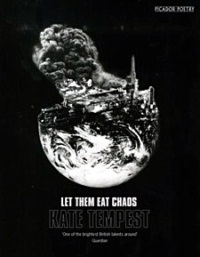 Kate Tempest was born in London in 1985. She works across the shrinking gaps of a steadily converging media industry. Equally at home within the genres of theatre, performance, poetry and music, her name now appears on album covers, poetry books, and billboard hoardings. It is fitting then, that her individual works blend elements of oral, sonic, visual and written culture.
Kate Tempest was born in London in 1985. She works across the shrinking gaps of a steadily converging media industry. Equally at home within the genres of theatre, performance, poetry and music, her name now appears on album covers, poetry books, and billboard hoardings. It is fitting then, that her individual works blend elements of oral, sonic, visual and written culture.
Her 2016 work, Let Them Eat Chaos, was published by Picador, composed for live performance and released as an album of the same name.
Kate Tempest was nominated for the Mercury Music Prize for her debut album, Everybody Down, and received the Ted Hughes Award and a Herald Angel Award for Brand New Ancients. Kate was also named a Next Generation poet in 2014.
Books by Kate Tempest
2016 Let Them Eat Chaos
2016 The Bricks that Built the Houses
2015 Hopelessly Devoted
2014 Hold Your Own
2014 Everybody Down
2013 Wasted
2012 Everything Speaks in its Own Way
Awards
2016 Costa Book Award for Best Poetry Collection (shortlist)
2014 Next Generation Poet
2013 Ted Hughes Award
new poetry
by Kate Tempest
fleursdumal.nl magazine
More in: Archive S-T, Archive S-T, Art & Literature News, Kate/Kae Tempest, Tempest, Kate/Kae
Mels wordt verblind door de schittering van de zon op de Wijer.
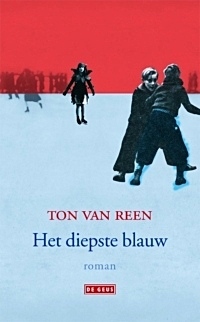 Het door het water gewitte zonlicht maakt alles wit. Het kleurt de weilanden rond het dorp wit.
Het door het water gewitte zonlicht maakt alles wit. Het kleurt de weilanden rond het dorp wit.
De rode daken zijn wit. De blauwe daken zijn zilverwit. De lichtgroene bomen zijn blinkend wit als van parelmoer. De kinderen in de straat zijn wit, allemaal in het wit gekleed, met witte schoenen en met ijskoude witte gezichten.
Het witste wit zet de tijd stil. Wit van woede is hij. Omdat ze hem allemaal hebben laten barsten.
Een wolk schuift voor de zon en laat zijn woede verdampen. De kinderen krijgen hun kleur terug. Ze hebben rode kersentrosjes rond de oren en hinkelen zingend over de stoep.
Ton van Reen: Het diepste blauw (072)
wordt vervolgd
fleursdumal.nl magazine
More in: - Book News, - Het diepste blauw, Archive Q-R, Reen, Ton van
Thank you for reading Fleurs du Mal - magazine for art & literature